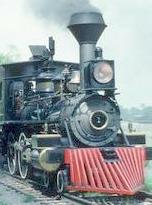 Every now and then, in explaining a new idea, it helps to return to the basics. And when discussing OpenReader and its potential to aid the e-book industry–not just consumers–we can’t help but recall the history of U.S. railroads and the many millions that entrepreneurs lost without standards in place.
Every now and then, in explaining a new idea, it helps to return to the basics. And when discussing OpenReader and its potential to aid the e-book industry–not just consumers–we can’t help but recall the history of U.S. railroads and the many millions that entrepreneurs lost without standards in place.
Here is a reproduction from a TeleBlog post from June 6, 2003:
…Many of the format chauvinists forgot the concerns of most book-lovers, who care more about convenience and functionality and other boring stuff than about technological purity. Nongeek readers are like railroad passengers. They’d rather not have to change trains to accommodate different track widths.
Thank goodness that the gauge chauvinists of the 19th century didn’t prevail in the railroad world. Check out A history of track gauge, a Trains Magazine article by George W. Wilson, a UCLA history professor and author of “American Narrow Gauge Railroads,” which the magazine calls “the definitive history of the subject.” He writes:
“The editor of the principal railroad trade journal of the 19th century, Matthias Nace Forney of The Railroad Gazette, in the course of his opposition to the narrow-gauge movement in the 1870’s, reported that railroad engineers with whom he had discussed the question had responded, in general, that 4 feet, 8-1/2 inches was slightly suboptimal, and that something around 5 feet 0 would have been better. Forney agreed, but felt that homogeneity for free-running of equipment nationwide at 4 feet 8-1/2 was more important than any gains that could be gotten by an effort at change.
“No doubt modern engineering techniques could be used to identify an optimal gauge, but short of an impressive demonstration to the contrary, Forney’s view of the 1870’s remains the most valid judgment.”
Mightn’t many of the e-book formats be the equivalent of the old narrow-gauge railroads for mining or whatnot? Nice for buffs and specialized apps, but please don’t inflict them on the world at large, which needs standards. We’re not all fixated on the Colorado Comstock.
Still true! Will we really benefit from dead-end proprietary systems in the Comstock vein? Most readers, writers and publishers will prefer ease and fairness and an open approach, and that’s what OpenReader will give them. Let the content, not narrow-gauge, format-related alliances, dictate which books succeed in the marketplace.



























